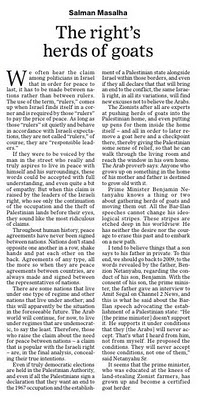The reality that will develop will not be a prophetic binational vision: The opposite is true. It will be a patently inhuman reality over which a black flag will fly, on which will be written in blood, 'This is the Balkans.'
Salman Masalha ||
Two backward peoples
The poet Taha Muhammad Ali, who recently passed away, revealed to us in one of his poems that it took him 60 years to realize that "water is the best of drinks / And bread is the tastiest of foods." Someone who takes so much time to understand reality can be tolerated. He's allowed to be backward and learn slowly; he'll write poems about that. But it's different when we're talking about the backwardness of a nation, and how much more so, its elected leadership.
It seems that the people who populate this land from both sides of the "national" barricade belong to "peoples" that are slow to grasp reality, at least for the past three decades. And this slowness is most evident among the leaders.
The milestones of this slowness stand out for all to see. One of these was when the Zionist movement, during its beginnings, adopted the claim that was originally Christian: "a land without a people for a people without a land." Thus, it accepted anti-Semitic claims and made them its own. But it completely ignored the reality in the country and its inhabitants. Only years later did the Zionist leaders, led by David Ben-Gurion, suddenly discover that "the land is not empty."
When the immigration waves increased, the situation in the land changed. The tensions surfaced with all their gravity. The conflict between the Zionist movement, which was orderly and organized, and the land's inhabitants who were still in a pre-national stage began to grow.
With the cynical encouragement of the colonialist powers, the situation became more complicated. The world order that crystallized after World War II put the partition plan on the agenda. The Zionist leaders knew to jump at the chance. But that wasn't the case with the Arab leaders.
After two decades of slowness on the part of the Arabs to grasp reality, the 1967 war broke out and completed the occupation of the land beyond the 1948 hudna (armistice ) lines. The war was a turning point in the conflict. It brought Zionism into close contact with the emotionally charged heritage sites on which the dream of "a Jewish homeland" was based. But it led to a situation in which Israel "swallowed" the land's residents who were beginning to consolidate themselves into a separate national movement.
History doesn't remain stagnant, nor does demography. Two decades of settlement, wars, intifadas and rapid demographic change went by until the leaders of both peoples realized there was no choice but to divide the land. With that, we all returned to square one.
Slowness in grasping the national, social and political situation has led to disasters in the past and will bring more disasters in the future. This slowness is a crime of historic proportions, committed by the leaders. The price will be paid by people, with a great deal of blood.
That's why we must put aside claims of justice - because all people who demand total justice in this conflict are cut off from reality and are merely grasping at delusions. They help themselves and those around them fall into useless dreams that make both peoples act as if they were outside history. This leads to a dark tunnel from which there is no escape; to perpetuating hatred on a primeval path.
The reality that will develop as a result will be concrete and historic. It will not be a prophetic binational vision: The wolf shall not dwell with the lamb, and swords shall not be beaten into plowshares. The opposite is true. It will be a patently inhuman reality over which a black flag will fly, on which will be written in blood, "This is the Balkans."
*
Published: Opinions-Haaretz, 13 January 2012




 Salman Masalha
Salman Masalha











